










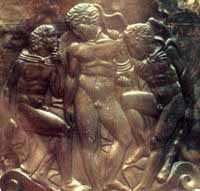


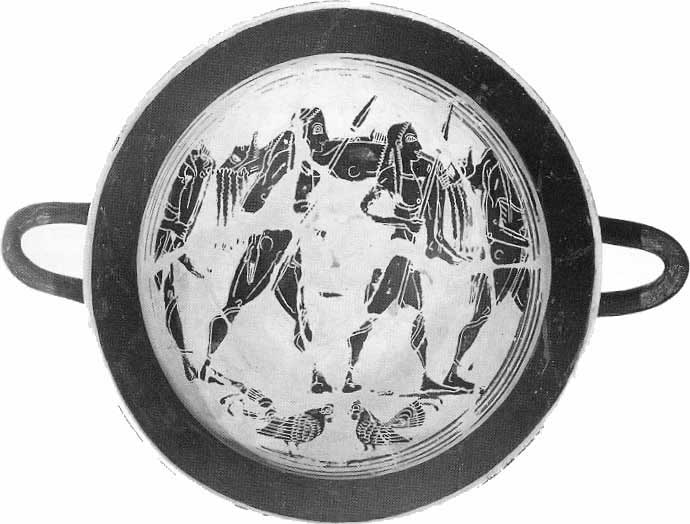
by

I wish to dedicate this story to Warrior Naked Wrestler, as he is the Man who if you want to understand the concept of Masculinity, time and again has explained it. In appreciation of his efforts I would like this story to be for him, Thank you Naked Wrestler for all your help.
With Warrior Love



Xerxes was King of Persia, Emperor of Greater Persia, the greatest empire on earth, and even, as far as he was concerned -- and nobody argued with Xerxes (at least not anyBODY that wanted to keep its head!) -- he was a god! -- yes, a god incarnate -- and therefore unstoppable.
By Zeus! thought Leonidas, himself a king, but a king of Sparta, one of two kings of the tiny and constitutional city-state in the south of Greece, the arrogance of the man, king, yes, emperor, if he must, but only the Gods make men immortal, sometimes into Gods themselves, but only the Gods do that, it was never done and cannot be done by men!
The Spartans didn't like the Persians.
They didn't like their arrogance, their greed, their love of luxury.
And their hatred of freedom.
For years the Spartans had warned the Persians to stay out of Greece and to leave the Greek city-states in Asia Minor alone.
And yet the Persians had seized the Greek cities in Asia and now Xerxes was moving in full force against the Greek homeland itself.
Bringing with him the greatest army the world had ever seen.
Leonidas was furious! Who by the Twin Gods Kastor and Polydeukes, who by the great Warrior God Ares Himself, did this Xerxes think he was? He had all the immense empire of Persia and now he was on his way into Greece to -- he thought -- gobble it down and add it to the rest. How big did he want to get? And why?
Wasn't this just greed? Well forget it!
Nothing was more despicable to the Spartans than greed.
Every Spartan, including the kings like Leonidas, had been taught all their lives to have enough, but never more than enough.
And that's how they lived -- lives of simplicity, austerity, and equality.
And lives of Freedom.
The Spartans were Free.
And Equal.
They even called each other "The Equals."
And they would never give that up.
Not ever.
Leonidas would sooner be castrated and see his balls given to Xerxes on a silver platter than he would hand over Greece and especially Lakedaimonia, the Spartan lands, to a tyrant like Xerxes.
And if stopping the greedy, arrogant, and enslaving Persian and his hordes meant that Leonidas had to give up his life in holy battle, if he went to join the great War God Ares, then he would go, knowing he went having stopped that arrogant Xerxes and his greedy Persians.
As Leonidas had told Xerxes when Xerxes wrote to him, saying, "It is possible for you not to fight the gods but to side with me and be monarch of Greece";
Leonidas wrote back: "If you understood what is honorable in life, you would avoid lusting after what belongs to others. For me, it is better to die for Greece, than to be monarch of the people of my race."
And that was the end of that discussion.
Now Xerxes was on the march, and Leonidas fully intended to live up to his words:
"For me, it is better to die for Greece, than to be monarch of the people of my race."
Leonidas had discussed it with his wife, Gorgo, and she of course supported what he planned to do, adding "Either bring home your shield, or be carried home upon it," which, if not very original, was at least very Spartan.
But then, Gorgo was a Spartan Woman.
When she was asked by a woman from Athens, "Why are you Spartan women the only ones who rule over their husbands," she answered, "Because only we are the mothers of Men."
Of course Gorgo didn't actually rule over Leonidas.
But while Leonidas occupied himself with his Warrior and kingly duties, Gorgo did have the responsibility of day-to-day management of their farm -- giving her a lot more freedom than the average Athenian Woman.
Leonidas had also talked it over with Eryx, known universally as "The Polemarch," "The War Leader" -- for, after all, Eryx was his Warrior Lover and second in command of the army -- and Leonidas trusted him completely.
What both Men understood was that it would fall to Sparta to buy the time needed for the other Greeks, and especially the Athenians, to organize a complete defense against the ruthless and oncoming Persians.
So they needed to get together a small but determined force, one that would delay the Persians or die trying or both, and then other Greeks would have the chance to properly stop the Persians and then push them back -- and out of Greece.
Looking at the map, and knowing how the Persians were coming, Leonidas and Eryx decided that the place to stop them would be Thermopylai, a narrow pass in the north through which the Persians had to come.
They would stop the Persians at Thermopylai.
Or die there.
"Never retreat, never surrender" was what they'd been taught, and what they would do.
And they knew the Warrior God would bless them if the battle was fought by proper Warriors, you know what I mean, don't you? A small force, say 300 males? NO, not just 300 males, but 150 devoted and Bonded Warrior Couples, 300 MEN in all, they would march together, eat together, look to each others needs, and before battle, rub dicks together, then fight as Spartans do, taking on the enemy while protecting each other. Warriors and Lovers, Lovers and Warriors, the best way.
Leonidas and Eryx between them picked the best Warriors for the force of 300.
And, knowing the odds were against them, they required that each Man have a living son, who would stay in Sparta -- there to form the core of the next generation of Invincible Spartan Warriors.
So it was that the "The 300" started out for Thermopylai, marching in step, 1,2,3,4, to the sound of the Spartan pipes and the tune of a martial song written by their great Spartan national poet Tyrtaios, a song reminding them that they were the unconquered blood of Herakles, telling them to welcome the darkness of Death as much as the light of the Sun, instructing them to endure the bloody slaughter and standing close, reach out for the foe, "for it's fine for a brave Man to die, falling among the front-fighters, Fighting for our Sacred Sparta" --
a song which ended by singing the praises of the Five Divine and Spartan Virtues: Piety, Justice, Self Control, Courage, and Wisdom.
The Spartans were wearing just greaves on their shins and a helmet, and carrying a shield and a spear and sword and when I say they were wearing nothing more I mean NOTHING more for these were true Spartans and MEN and that was how they went into battle.
As it was said, "Spartans fight with TWO blades on show, their Spear and their Manhood."
And they feared nothing, not riches nor even dying after all, for if you died in battle, gloriously and courageously, you went to The Isles of the Warrior Blest, no more mess bills, but as much Hunting and Fighting and Wrestling and Dick Rubbing with your Warrior Lover as you wanted.
And so they marched along, nude, proud, and singing aloud the praises of Courage and War and Eros, Eros being that Manly Love which makes Brave Men Braver still.
When the Spartans arrived at the narrow pass called Thermopylai, the Hot Gates, they knew this would be the ideal place to take on the Persians, especially if they fixed up the old wall across the pass, all those Persians couldn't go into that small narrow space, but they the 300 could, so that just a few at a time they could take on thousands.
Yes this would work, by Ares this would work, the Persians would be driven back but if not then at least stopped and the courageous Spartans would join Him, Ares, in Warrior Paradise, so win, win -- Spartans don't lose -- maybe when dick against dick cum second, but defeat, what's that? Not something a Spartan knew.
They formed their camp, built up the wall, and made all their other preparations.
And then they were ready to relax.
For it was the Spartan custom, having spent all their lives in preparation for War, to relax before an actual battle.
To exercise and groom themselves, and, it was said, prance, like thoroughbreds before a race.
And that's what Leonidas and his Men did at Thermopylai, at the Hot Gates, while Xerxes and his army of armageddon was camped just a few miles away.
Some of the Men exercised -- Wrestled, actually -- in the nude -- as they'd done all their lives.
Hard Spartan Body against Hard Spartan Body.
Hard Nude Spartan Body against Hard Nude Spartan Body.
Pecs, abs, bi's, tri's, brachs, obliques, delts, lats, traps, quads, glutes -- and genitals.
Genitals mashed against abs, thighs, arms, backs, legs, hard pecs and each other as each Man strove to throw his antagonist.
The Men struggled furiously, grunting, groaning, the hot raw sweat pouring from their lean and muscled bodies.
Finally one Man would be thrown.
Then the Ephedros -- the back-up -- would Wrestle the victor.
Hard Spartan Body against Hard Spartan Body.
Hard Nude Spartan Body against Hard Nude Spartan Body.
Some of the Men watching would become quietly aroused.
Then it would be their turn.
To Wrestle.
Hard Spartan Body against Hard Spartan Body.
Sacred Spartan Manhood against Sacred Spartan Manhood.
At one point Leonidas put Eryx in a vicious armbar.
Eryx groaned.
"Did that hurt, Warrior?" asked Leonidas.
"Maybe," said Eryx.
"If it did, my Warrior brother, that's good."
"Because pain is weakness leaving the body."
"Oh?" said Eryx.
Eryx swiftly put the King -- his Lover -- in a fierce chokehold.
"The pain you feel is weakness leaving your body, my Warrior brother," said Eryx.
Leonidas laughed.
All the Spartans gathered round the Wrestling Pit laughed.
That was the difference between Sparta and Persia.
The King and his Warriors were, for all intents and purposes, Equals.
Equals who could laugh together and at each other.
Yes, when on campaign the King commanded the army and yes, at home he sat on the Council.
But he was still one of the Peers, one of the Equals, and subject to law like all the rest.
When at home, for example, both Spartan kings took their meals in the Men's Messes -- just like every other Spartan Peer and Equal.
And at home or on campaign, the kings Wrestled -- with their Peers.
Which made the king respected -- but not feared.
For Sparta had long ago abolished differences in wealth and made VALOUR the only criterion for advancement in society and state.
Not greed, but Virtue.
Not self, but Valour.
That was the Spartan creed.
So: Some of the Spartans wrestled.
While others started grooming.
Grooming?
Grooming what, you might ask, since they Lived and Loved and Fought nude.
Why, their hair.
Centuries ago, you see, Lycurgus, the revered Spartan law giver, had said that long hair made a handsome man look better and an ugly man more formidable. He also said it was the natural means of adornment and cost nothing. So all Spartans were, by long hair, Equals, Men and Warriors and Lovers!
Which is why, at their post in front of the wall at Thermopylai, Stelios said to Eumedes (his fellow Warrior/Lover),
"O my Warrior Brother, after all this marching my dreadlocks feel dirty and disheveled."
"Help me redo them."
"You know that because tomorrow we Fight -- we have permission to do that."
Eumedes -- whose name meant "virile male genitals" -- looked at his Warrior Lover's strong nude body.
"Sure, my brother," he said, "I'll help."
"And then you can help me."
"Sit down on that ledge over there."
Stelios sat with his legs dangling over a low ledge.
Eumedes came up behind him and scooted his lean muscular form against his Lover's, putting his legs around him and nestling his genitals in the small of Stelios' back.
Then he began moving up and down, dressing his Warrior Love's hair.
Eumedes and Stelios had wrestled each other earlier in the afternoon, and a hot and hard match it had been, their thick Spartan dicks and heavy Spartan balls often clashing and smashing together.
Now, feeling Eumedes' strong Warrior's body and Fighter's cock and balls rubbing against his back, Stelios soon got turned on, and he began to get hard.
"Oh, my brother," he said, "my dick is getting hard."
"And a very big dick it is too, Warrior," responded Eumedes.
"And tonight I'll make it shoot."
"Perhaps you will and perhaps you won't," answered Stelios.
"But you know it's forbidden for us to be hard in public."
"Then you need to figure out a way to make it private," said Eumedes.
Stelios, known for his aggression and speed, quickly swung around and put his legs over Eumedes', so that the two Warriors were face to face and their Warrior cocks were facing each other in a small private arena formed by their groins.
"Now we can arrange each other's hair while our cocks play," said Stelios.
"And none will be the wiser."
So Stelios and Eumedes worked on each other's hair, while their cocks grew hard and gently rubbed, dripping pre-cum.
The other Warriors saw what Stelios and Eumedes were doing, and soon many were doing it.
Dressing each other's hair while their hard Warrior cocks were at play.
What was going on didn't escape Leonidas' or Eryx' notice, but the Men had taken pains to keep their cocks hidden by their groins, and the two commanders well knew that the rules allowed for just this sort of relaxation before battle.
So instead of calling them out for it, when King Leonidas saw his Men seeing to each other's hair he said to Eryx "Oh my Warrior Brother, I want my hair fixed too." "And so do I," said Eryx to his King and Lover.
When Therimachos -- whose name meant Brutal Fighter -- saw this he decided if it was good enough for the King it was good enough for me -- and for Thrasymachos, Bold Fighter, his Love; as did Timomachos, whose name meant Honor Fighter, and Eupolemos, whose name meant Good War, and Phormion and Sebro and soon many others.
Meanwhile the Persians were trying to figure out what to do about those pesky and annoying Spartans, those same reprobate Spartans who'd thrown the Persian messengers into a deep pit when they'd demanded that Sparta surrender, those troublesome Spartans, just a handful, who were nevertheless blocking the way. Were they ready for battle? If so how ready were they? Were there more than they looked, if so how many? Xerxes knew what to do -- he sent for his best scout, and instructed him to go and find out how well the Spartans were prepared for battle.
So the scout rode to the Spartan camp but when he got there he could see little as there was a big wall in the way. But what he did see in front of the wall amazed him, for some of the Spartans were wrestling and were wrestling completely naked, something a Persian would never do.
Did they not care? the scout wondered, Should they not have some armour or loincloths on?
No, they were Warriors and Men, they weren't ashamed, they had nothing to be ashamed of.
The Persian also took note of their lean and strong physiques, and their stern and bearded faces, and he felt a twinge of fear.
And then he saw something that made his eyes feel like they were out on stalks.
For some were seeing to each other's hair, no it couldn't be, but no matter how long he looked, it was the same: Yes they were arranging their hair, and if they had nothing better to do than this, thought the scout, then they really were ready and had no concern about fighting or even dying, only a determination to face Death as True Spartans.
Of course the scout was too far away to see that the Men were also enjoying the gentle rubbing of their cocks, and if he had seen it, he wouldn't have believed it.
In Persia, if a man wanted another male, he would simply grab a slave boy, the younger the better, and brutally penetrate him anally till his lust was satisfied.
If the slave boy was very young, and died as the result -- why worry?
The Empire was full of slaves: Greeks, Phoenicians, Assyrians and Jews, Lydians and Carians, Chaldeans and Celts, Babylonians and Bactrians, Egyptians and Moors, Arabs and Armenians, Phrygians and Sagartians and Mysians, and so many more -- even people from Ethiopia and India.
And one less slave -- one slave boy dead from a Persian's lust -- wouldn't matter.
That Men could make Love as equals -- would never have occurred to a Persian.
So what the scout saw -- was the Men arranging each other's hair.
And once again the sight scared him, for if they had nothing better to do than this, thought the scout, then they really were ready and had no concern about fighting or even dying, only a determination to face Death as True Spartans.
It had to be admitted, thought the scout, these were real Men, true Warriors if they could look to each other's needs like that, doing each other's hair, on the eve of a battle likely to kill them all.
And then the scout realized his problem -- what could he tell Xerxes?
For in Persia the dressing of hair was done by women, and by slave women at that.
Could he say, "Oh, uh, the Lakedaimonians seem to have set up a hair-dressers"? No way! Xerxes would never accept that, so what could he say? The scout started back, and as he wan't being followed, he took his time.
When he was brought in front of Xerxes, experience told him how to begin and he bowed very low for as the saying goes "Keep the head low, keep the head," so he bowed humbly and said "Oh Great King, live forever."
"Yes, yes," said Xerxes impatiently, "Get on with it!"
"Oh great monarch, I only wish to serve, and give a report of exactly what I saw, so..."
"Yes, get on with it or off with your head!"
"Oh great king, highest of the highest, strongest of the strong, unbeaten in war, generous in peace . . . "
"Yes, yes," said Xerxes,
"I saw the Spartans, and they were . . ."
"Well?"
The scout made himself as small and humble as he could.
"Combing their hair, Sire."
"WHAT?"
"Combing their hair."
"I HEARD," said Xerxes, and at this point he went red in the face, "but I just didn't believe what I heard."
"Sire, I think what I saw were Warriors, ready to fight and so with nothing better to do than to make themselves look good for the fight -- they simply don't care about anything else, just each other and each other looking good in the fight."
Xerxes was still incredulous, as Herodotus tells us:
When Xerxes heard that, he could not comprehend the fact that the Lakedaemonians were actually, to the best of their ability, preparing to kill or be killed. What they did appeared laughable to him, so he sent for Demaratus, an ex-Spartan king who had been exiled for being pro-Persian and was living at Xerxes' court, and who was in his camp. When this man arrived, he asked him about each of these matters, wanting to understand what it was that the Spartans were doing.
Demaratus said, "You have already heard about these men from me, when we were setting out for Greece, but when you heard, you mocked me, although I told you how I expected things to turn out.
"I told you, O King, that fighting singly the Spartans are as brave as any man living, and together they are the best warriors on earth. They are free, yet not wholly free: law is their master, whom they fear much more than your men fear you. They do whatever it bids; and its bidding is always the same, that they must never flee from the battle before any multitude of men, but must abide at their post and there conquer or die.
"It is my greatest aim, O King, to be truthful in your presence. So hear me now. These men have come to fight us for the pass, and it for this that they are preparing. This is their custom: when they are about to risk their lives, they arrange their hair. Rest assured that if you overcome these men and those remaining behind at Sparta, there is no one else on earth who will raise his hands to withstand you, my King. You are now attacking the fairest kingdom in Greece and men who are the very best."
What he said seemed completely incredible to Xerxes, so he then asked how they, who were so few in number, would fight against his army. Demaratus answered, "My King, take me for a liar if this does not turn out as I say." So he spoke, but he did not persuade Xerxes.
That night, the last one before the battle, the Spartans looked and felt great! They had exercised and eaten and rested and groomed their hair. Then they'd sung their hymns, their simple Dorian hymns, hymns to battle and Herakles and Agon and Ares.
Hymns to Valour.
And Virtue.
And Honour.
And to Sparta.
Their Sacred Sparta.
There was just one more thing left to do then -- tomorrow they would Fight for all their worth, and die if they must, but now they would not be 300 individual Men, but 150 Warrior pairs, Strengthening their bonds through the Struggle and Striving of Spartan Phallus against Spartan Phallus.
PHALLOMACHIA they called it:
PHALLIC BATTLE.
Which led inevitably, they knew, to PHALLIC BOND.
And so it was that night, that Stelios -- the pillar -- and his Warrior Lover Eumedes -- whose name meant virile male genitals -- both still hot from their afternoon of Wrestling and grooming -- now lying entwined on the hard earth of Greece -- set their thick Spartan Warrior Dicks to Fighting.
Humping each other with all their might, struggling for supremacy, their two massive uncut rods, each as strong as Herakles' legendary club, rubbed and ground and thrust together, the two Warrior-Lovers moaning and groaning with lust and love, feeling their balls filled with their mighty Warrior progeny crashing and smashing together until, at the same sacred moment, their white and holy Warrior jizz was released to Fight its final battles in the thick pools of cum on the Warriors' rigid abs and hard-muscled pecs.
And all around them the other Lakedaimonians, proud, strong, invincible, did the same, celebrating their Warrior Love through the Exalted Struggle of their Warrior Manhood.
For that's what it meant to be a Spartan -- to Struggle and Strive and FIGHT with all your might for the Honour of Sparta, the Perfection of Your Manhood, and the Good of Greece.
The 300 Spartans defended the pass for three days, inflicting tremendous damage on Xerxes' army.
But on the third day, a traitor showed Xerxes a way around the pass, and the Spartans, betrayed and taken from behind, were killed.
To a Man.
Xerxes, in an act which exemplified his character and his fear, had Leonidas' body found, beheaded, and the trunk crucified.
It didn't matter.
It didn't matter what Xerxes did to Leonidas in death.
All that mattered was what LEONIDAS and his HEROIC SPARTANS had done in LIFE.
L e o n i d a s
Spartan HeroTheir courageous action had given the other Greeks the time they needed to rally their forces.
At Athens, the city was abandoned and burned by the Persians, but the Athenians inflicted a huge defeat on the Persian navy at Salamis.
Beaten on both land and sea, Xerxes was terrified -- afraid he might be trapped in Greece.
So he scurried back across the bridge he'd built from Asia to Europe, leaving a large army of Persians and other subject peoples behind.
And, just one year later, a UNITED Greek army, which included a full complement of Spartans and with a Spartan in supreme command, decisively defeated the Persians at Platea, ending forever the Persian dream of conquering Europe.
Because to conquer Europe they'd have had to gotten past the Spartans, and they knew they couldn't do it.
At Thermopyalai, the Greeks put up a marker for The 300.
It reads:
Go tell the Spartans, stranger passing by,
That here obedient to her laws we lie.While at Platea, the united Greeks erected an altar with this inscription:
Here did the Greeks, when with Ares' aid they had triumphed in battle,
Driven the Persian from their frontiers and delivered their country from bondage,
Set up an altar together for Zeus, Liberator of Greece.So ends my story, the rest is history, other battles Greeks versus Persians, other battles, free men versus tyrants, Roundheads versus Cavaliers (English civil war / 17th century) Americans versus British (US war of independence / 18th century), Greeks versus Turks (1821-1832 / 19th century), RAF versus German air force (WW II 1940 / 20th century), Frot men versus Analists (2000 - ?? / 21st century), we'll see how it turns out, I know how I want it to.
Warrior Love,
Brian
AFTERWORD
A note from Bill Weintraub about the illustrations in this story:
As you can see, at the time of the Persian Wars, Greek Warriors wore their hair in what we would call "dreadlocks."
XXXXA Spartan Warrior or King
XXXXHe's barefoot and wears a simple red cloak,
XXXXhis only article of clothing --and his hair is elaborately dressed:
The Spartans in this kylix or drinking cup also have their hair in dreadlocks:
Which is what inspired this artist's rendering of a nude Spartan Warrior:
The other figures in the story are of Biton and Kleobis, and their hair too has been elaborately dressed:
Biton and Kleobis were from Argos -- not Sparta -- but Argos is in the same part of Greece -- the Peloponnesos -- so it's likely that the braiding was similar in both places.
Now: what's important to understand is that this sort of very intimate grooming performed by Warrior for Warrior is common in all-male, pre-heterosexualized, environments.
Tattooing, for example, used to be restricted to Men.
A Woman who had tattoos was considered an oddity -- thus the Tattooed Lady in the Carnival or Circus.
But tattooing was very common in all male-environments such as the military.
This photo of one sailor tattooing another is from the American forces in World War II:
And you can see that it's a very intimate activity.
Wrestling too was and is still common in the military.
Whether for training:
Or just for fun:
So you can see that military life didn't change all that much between Thermopylai -- in 480 BC -- and WW II in 1944.
About 2400 years.
And the reason for that is that Men evolved to bond as Warriors, and that bonding behavior, which is in our genes, takes certain very predictable forms.
Including Warriors practice-fighting each other, such as Wrestling:
And grooming each other:
These activities strengthen the Warrior Bond and Warrior Altruism -- which are essential in a Fighting Force.
Of course, the Men can also relax together in other ways:
And here too you can see that the body language is very intimate:
And here's something which may blow you away.
This is a vase painting of Achilles and Ajax playing a game very like checkers -- during the Trojan War:
Kind of amazing, huh?
Greek Warriors ca 1200 BC:
American Warriors ca 1944 AD:
Warrior behavior is very consistent not just over the years -- but over the millenia.
So -- the Spartans -- and it would appear the Argives and others in ancient Greece -- wrestled each other and dressed each other's hair.
Our American soldiers in WW II wrestled each other -- and tattooed each other -- which is another form of male-male grooming.
Again, these are very basic Warrior behaviors.
In the Americas today, they continue among criminal gangs.
This is a guy from a Central American gang:
The tattooing was probably done in prison by his fellow prisoners.
And while it's the bane of law enforcement, it serves the same function now as hair-grooming did for the Spartans.
It's intimate, and it bonds.
Again, it's very Warrior Male.

In addition, the Spartans practiced a severe, austere, and egalitarian form of Warrior Bonding through their communal messes or eating clubs.
All the Warriors took their meals communally throughout their lives.
Once they were past age seven, they never ate a home-cooked meal again.
They always ate at the mess.
Of course soldiers today eat at messes too.
The difference is that the Spartans did so from childhood on, and throughout their lives.
The result, of course, was a very egalitarian Fighting Force whose Men were super-bonded to each other.
And the Spartans put the finishing touch on that through a system of male-male sexual and romantic bonding -- about which you've just read -- and which elevated the normal Hoplite bonds to a level of ferocious intensity.
And that's the reason the Spartans were such a formidable Fighting force.
When we create our New Sparta, we'll have all the same institutions.
And as Men, you'll be very happy -- just as the Spartans were.
Because you'll be living the way God and nature intended MEN to Live.
I salute and thank Warrior Brian Hulme for his excellent telling of the story of Leonidas, Eryx, Stelios, Eumedes and all the other noble and heroic Spartan Men -- WARRIORS --
who in choosing to die, made possible freedom not just for Greece, but for all the Western world.
November 10, 2010


Plutarch on Sparta at War:
In time of war, too, they relaxed the severity of the young men's discipline, and permitted them to beautify their hair and ornament their arms and clothing, rejoicing to see them, like horses, prance and neigh for the contest. Therefore they wore their hair long as soon as they ceased to be youths, and particularly in times of danger they took pains to have it glossy and well-combed, remembering a certain saying of Lycurgus, that a fine head of hair made the handsome more comely still, and the ugly more terrible.Their bodily exercises, too, were less rigorous during their campaigns, and in other ways their young warriors were allowed a regimen which was less curtailed and rigid, so that they were the only men in the world with whom war brought a respite in the training for war. And when at last they were drawn up in battle array and the enemy was at hand, the king sacrificed the customary she-goat, commanded all the warriors to set garlands upon their heads, and ordered the pipers to pipe the strains of the hymn to Castor; then he himself led off in a marching paean, and it was a sight equally grand and terrifying when they marched in step with the rhythm of the flute, without any gap in their line of battle, and with no confusion in their souls, but calmly and cheerfully moving with the strains of their hymn into the deadly fight.
Neither fear nor excessive fury is likely to possess men so disposed, but rather a firm purpose full of hope and courage, believing as they do that Heaven is their ally.
Also by Warrior Brian Hulme:
The credit crunch will NOT crunch my Manhood my Masculinity or my Warriorhood
CAN MY MAN TO MAN RELATIONSHIP DRAW ME CLOSER TO GOD?
14th February -- or -- EROS DAY?
Warrior Fiction is presented by The Man2Man Alliance, an organization of men into Frot
To learn more about Frot, ck out What's Hot About Frot



© All material on this site Copyright 2001 - 2011 by Bill Weintraub. All rights reserved.




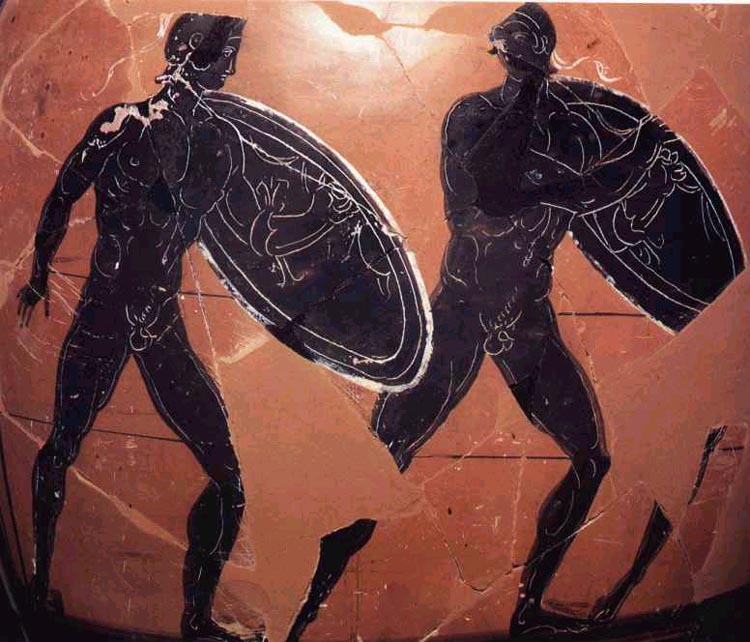
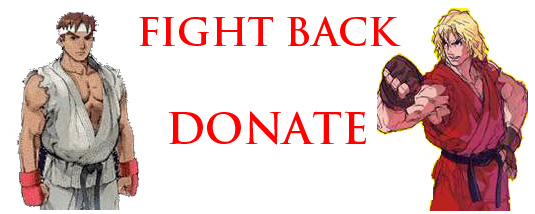





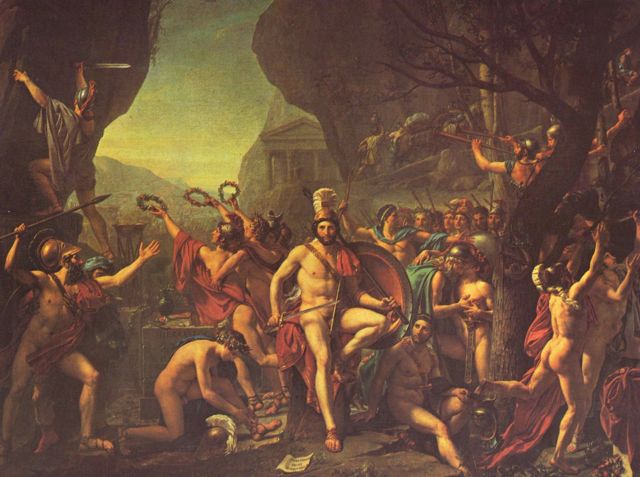
Click here for a larger version of this great painting.